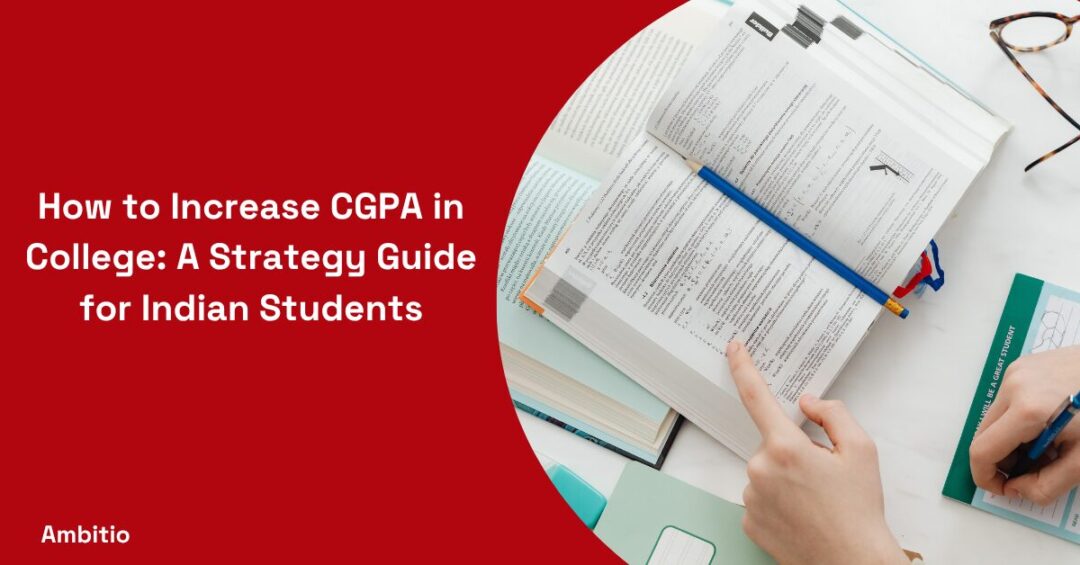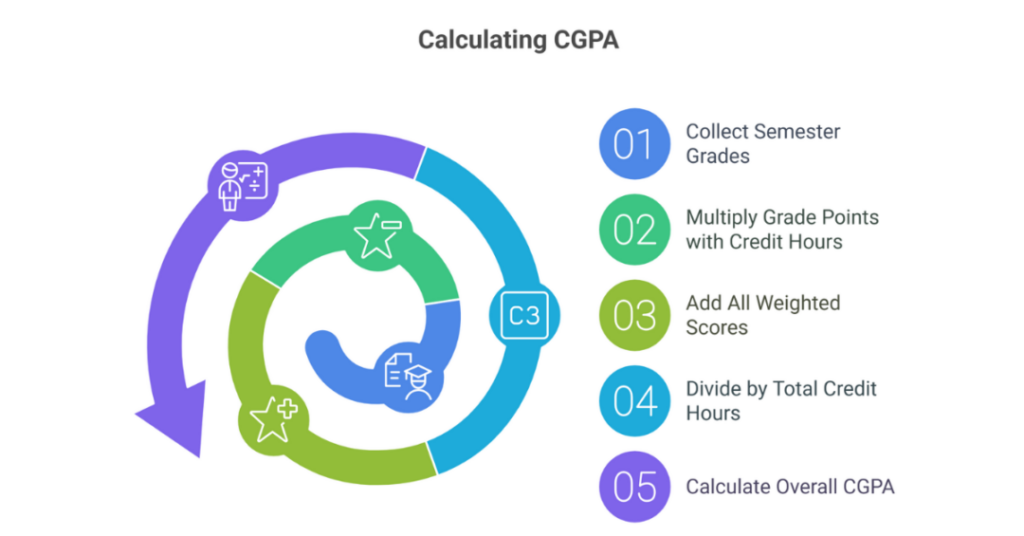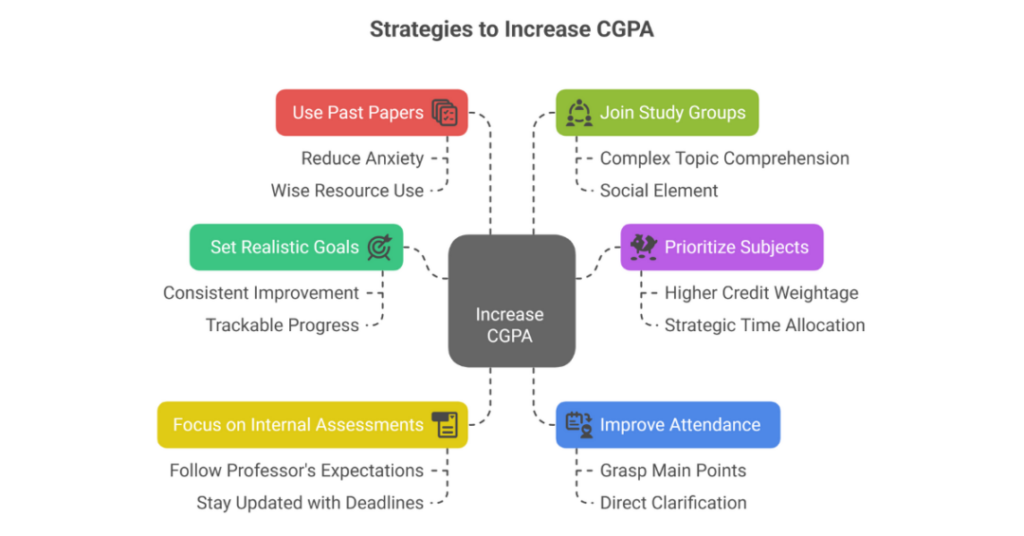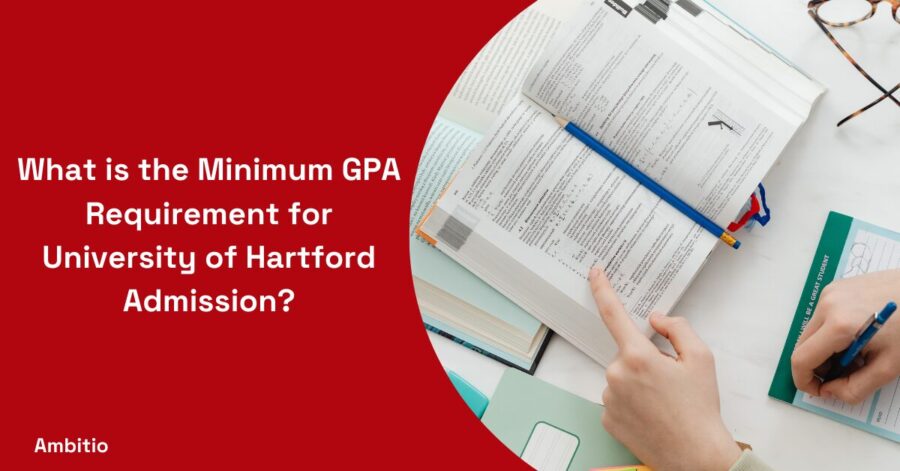16 June 2025
6 minutes read
How to Increase CGPA in College: A Strategy Guide for Indian Students

Key Takeaways
- How to increase CGPA starts with smart study techniques, active learning, and focusing on credit-heavy subjects.
- Consistent attendance, customized notes, and internal assessments can significantly improve academic performance.
- Final-year Indian students can still recover with re-exams, skill-building, and expert support for abroad education from Ambitio.
Over 65% of Indian students struggle to maintain a good CGPA, often due to poor time management, ineffective study habits, and last-minute cramming. The pressure to boost your CGPA while juggling internships, complex course content, and unrealistic academic goals is real and brutal.
But here’s the truth: you don’t need to be a topper to improve your CGPA. You just need a smarter, strategic approach that focuses on consistency, active learning, and using available resources the right way.
Why Your CGPA Matters More Than You Think?
Your cumulative grade point average isn’t just a number, it reflects your academic performance, subject proficiency, and ability to grasp complex concepts. For Indian students aiming for higher studies or top jobs, a high GPA shows discipline, dedication, and hard work.
How to increase CGPA? Prioritize exams, attendance, peer learning, and hands-on study groups. Create a plan, set realistic goals, and balance your schedule with the Pomodoro technique. Track your progress, enhance your overall GPA, and solve, not just memorize.
How to Calculate Your CGPA?
Understanding how your CGPA is calculated is the first step toward improving your academic performance.

Many Indian students often ignore this responsibility, missing out on actionable ways to boost their overall CGPA. Here’s how to calculate your CGPA effectively:
- Collect Your Semester Grades
Gather your score in each subject from the professor, usually given as grade points on a 10-point scale. - Multiply Grade Points with Credit Hours
For each course, multiply the grade point with the number of credits (CGPA Formula). This shows the subject’s weight in your academic growth. - Add All the Weighted Scores
Sum all the values from step 2 to get your total weighted score for the semester. - Divide by Total Credit Hours
Now divide the total weighted score by the total number of credits to get your semester CGPA. - Calculate Overall CGPA
Calculate your Cumulative GPA by adding all your semester CGPAs and dividing by the number of semesters to get your overall CGPA.
Common Reasons Indian Students Struggle With Low CGPA
Achieving a high CGPA in college isn’t just about intelligence. It’s about strategy, discipline, and self-awareness. Many Indian students enter college with ambition but soon find themselves juggling assignments, confusing concepts, and endless exams.
A GPA that doesn’t reflect their true potential. To improve, you first need to understand what’s pulling your grades down. Here are the most common reasons students struggle with low CGPA:
- Poor Time Management
Students often follow no fixed schedule, leading to last-minute cramming and incomplete understanding of subjects. - Lack of Conceptual Clarity
Memorizing instead of understanding complex concepts creates short-term results but long-term damage to academic performance. - Low Class Participation
Skipping lectures or not engaging with professors and peers reduces comprehension and confidence during exams. - Neglecting Internal Assessments
Focusing only on final exams and ignoring internal tests, assignments, or projects can significantly affect your CGPA. - Ignoring Mental and Physical Well-being
Burnout, anxiety, and lack of rest lower focus, consistency, and performance, something many students overlook.
How can I increase my CGPA: Step-by-Step Strategy
If you’re wondering how to increase CGPA, you’re not alone. Many Indian students struggle to turn their efforts into real academic results. The key is not working harder, but smarter.

With a strategic approach, a well-rounded schedule, and consistent habits, boosting your CGPA becomes achievable, even if you’re starting from a low percentage.
Set Realistic Academic Goals for Each Semester
Break down your goals into small, achievable targets for every subject. Don’t aim for 100%. Aim for consistent improvement in your score each semester. This keeps your progress trackable and reduces pressure while still contributing to personal growth.
Prioritize Subjects Based on Credit Weightage
Always choose the right subjects to focus your energy on. Subjects with higher credit weightage influence your CGPA more, so a better score here can shift your overall percentage. Allocate your study time accordingly in your daily schedule.
Focus on Internal Assessments and Assignments
Never underestimate internals, they’re often easier to score in and can buffer your exam scores. Follow your professor’s expectations, stay updated with deadlines, and use this as a chance to boost your GPA without added exam stress.
Improve Attendance and Class Participation
Being present isn’t just about marks, it improves your grasp of main points, allows direct clarification with professors, and builds a habit of discipline. Participation helps reinforce concepts and shows you’re serious about academic growth.
Use Past Papers and University Guidelines to Prepare
Solve past papers to understand the exam pattern and frequently asked questions. This reduces anxiety and helps you focus on what really matters. It’s an actionable way to revise while using available resources wisely.
Join Study Groups and Academic Clubs
Group learning enhances comprehension, especially when you’re struggling with complex topics. It also adds a social element, which can balance your study life with relaxation. Take a 5-minute break with peers or discuss difficult topics, both help!
Create a schedule that allocates time for revision, assignments, and short breaks. Remember: success lies in consistency, not perfection. With the right strategy, every Indian student can turn things around.
Smart and Effective Study Techniques That Actually Work for Indian Students
Studying hard isn’t enough; you need to study smart. Indian students often face syllabus overload, tight deadlines, and high expectations.
By using proven learning strategies tailored to university exams, you can boost retention, improve performance, and finally see a real difference in your CGPA.
Active Recall and Spaced Repetition Methods
Instead of re-reading or highlighting, quiz yourself on key concepts from memory—this is active recall. Combine it with spaced repetition, which means reviewing topics over increasing intervals. This method trains your brain to retain information longer and improves exam-day confidence.
Customizing Notes for University-Specific Exams
Generic notes don’t cut it. Tailor your notes based on your university’s exam pattern, frequently asked questions, and professor hints. Keep them concise, focused on main points, and include diagrams or examples that match how your syllabus is structured.
The Role of Peer Mentoring and Faculty Feedback
Studying with peers or seniors helps you understand tough topics faster. Join study groups where you can explain or learn concepts through discussion. Also, don’t hesitate to ask professors for feedback, it helps you identify blind spots and prepare more strategically.
How to Recover From a Low CGPA in Final Year?
For many Indian students, the final year feels like a last chance to fix academic regrets. If you’ve been asking how to increase CGPA this late, the good news is, it’s still possible.
With the right focus, smart planning, and a parallel focus on skills, you can turn things around and leave college on a stronger note.
Make the Most of Your Final Semesters
Treat every subject like a second chance. Attend regularly, stay consistent with assignments, and aim to score higher in credit-heavy subjects. Even a small boost in grades now can significantly lift your average GPA by the end of the year.
Consider Re-exams, Grade Improvements, and Credit Courses
Check if your university allows re-evaluation or retaking specific subjects. Some offer extra credit courses or improvement exams. These can give your CGPA a direct push, especially if you scored poorly in earlier semesters.
Build a Strong Resume and Skill Portfolio Alongside
While you work on your CGPA, also focus on building industry-relevant skills. A strong portfolio or internship experience can balance out a low CGPA when applying for jobs or further studies. It shows you’re still proactive, capable, and employable.
Conclusion
Improving your CGPA isn’t about overnight miracles; it’s about consistent effort, smart strategies, and taking ownership of your academic journey. For Indian students wondering how to increase CGPA and unlock global opportunities, the right guidance can make all the difference.
Ready to build a profile that goes beyond just grades?
Join Ambitio—India’s top study abroad consultancy. From CGPA recovery plans to complete profile building, we help you turn potential into admissions.
Schedule a call to start your journey with Ambitio, because your dream university won’t wait, and neither should you.
FAQs
How to increase CGPA if I have a low score in previous semesters?
Focus on scoring higher grades in upcoming semesters, especially in high-credit courses, as strong performances can significantly boost your overall CGPA.
How to increase CGPA through daily habits?
Stay organized, attend classes regularly, and revise topics consistently to gradually improve your CGPA.
How to increase CGPA if I struggle with certain subjects?
Seek help from tutors, professors, or join study groups to strengthen your weak areas and raise your CGPA.
How to increase CGPA with effective study techniques?
Use proven methods like the Pomodoro Technique and SQ3R to enhance retention and understanding, which helps increase CGPA.
How to increase CGPA by managing assignments?
Always submit assignments on time and apply feedback from instructors to improve future work.
How to increase CGPA using campus resources?
Utilize libraries, past exam papers, workshops, and academic counseling to get extra support for your studies.
How to increase CGPA while maintaining well-being?
Maintain a healthy lifestyle with proper sleep, nutrition, and exercise, as good health supports better academic performance.

You can study at top universities worldwide!
Get expert tips and tricks to get into top universities with a free expert session.
Book Your Free 30-Minute Session Now! Book a call now




























